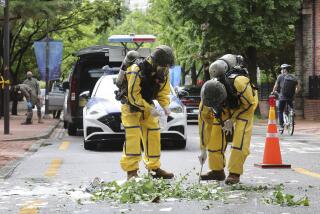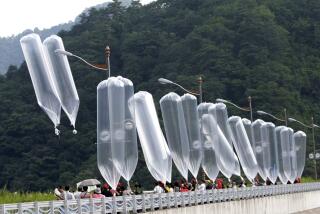Why Clinton Should Not Visit N. Korea
- Share via
WASHINGTON — President Clinton is trying to decide whether to undertake something that might be good for him personally, but terrible for America: a hastily planned, lame-duck presidential visit to North Korea.
Clinton already is scheduled to travel to Brunei and Vietnam in two weeks. The question now being weighed at the White House is whether, while in Asia, the president should pay a call on North Korean leader Kim Jong Il, who played host to Secretary of State Madeleine Albright last week.
This would no doubt be a milestone. No American president has been to North Korea. There might be a new deal on missiles for him to sign. The photo opportunities would be splendid: Clinton might travel by land through the demilitarized zone between North and South Korea.
And for Clinton, the benefits would be clear. A big North Korea trip might be an end-of-term addition to his legacy.
If he goes only to Vietnam, the coverage will focus on Clinton himself, since he didn’t fight in the Vietnam War. If a North Korea stopover is added, however, Clinton might be able to recast this trip with a larger theme: ending the Cold War in Asia--whatever that means.
But is the trip in the national interest? No, for three reasons.
First and foremost, a presidential trip to North Korea is not the kind of initiative that should be undertaken by a lame-duck president.
When President Nixon went to China, he did it in February of a year when he was running for reelection. He bore political responsibility: If voters didn’t like it, they could vote against him. Not so for Clinton in Pyongyang.
If George W. Bush wins the presidency Tuesday, the problems with a Clinton visit are obvious: The Republicans may want different policies for North Korea.
But even if Vice President Al Gore wins, the idea of a lame-duck Clinton trip is a lousy one. It would be Gore who has to deal with North Korea over the next four years, not Clinton. And so Gore should be the one who takes Kim Jong Il’s measure and establishes ties with him.
If the new president (Bush or Gore) stops in North Korea as part of his first trip to Asia--along with visiting Japan, China and South Korea--at least it will remind Kim Jong Il that he is not the center of the universe. A Clinton visit so soon after Albright’s would further inflate the North Korean leader’s self-importance.
Second, Clinton’s trip comes too quickly after Albright’s. There are implicit trade-offs involved in any high-level trip. Clinton and Albright would be, in effect, giving North Korea two visits for the price of one.
And third, the Clinton trip is unnecessary. Even if a missile deal is really ready to be signed, that can be done on a second Albright visit or a trip by national security advisor Samuel R. “Sandy” Berger.
Clinton administration officials tend to view criticism of their Korean policy as prompted either by Republican partisan politics or by those who don’t understand foreign policy. They seem to believe they are carrying out the overtures to North Korea in the same way the Nixon administration worked out its opening to China.
They are wrong. This is not like China. And the critics of a Clinton visit to Pyongyang include nonpartisan and Democratic foreign policy experts.
For example, Stanford University professor Michel Oksenberg, a China specialist who served with Albright on President Carter’s National Security Council, is strongly opposed to having Clinton visit North Korea as a lame duck.
Oksenberg argues that the Clinton administration should “work with the new team coming in, and let them have the opportunity to develop this relationship further, after widespread consultations with our East Asia allies and with the Congress.”
He also points out that Nixon didn’t go to China until more than half a year after Henry A. Kissinger broke the ice there. Moreover, Kissinger made two visits--and his deputy Alexander M. Haig Jr., one--to prepare the way, slowly and carefully, for Nixon’s visit.
All the pitfalls of a rushed Clinton visit were on display during Albright’s trip, when the secretary of State was photographed watching a huge military parade in Pyongyang in a way that seemed to convey at least acquiescence, if not approval.
Would Albright have stood by mutely for such a display in Prague or Moscow? Not likely. Does she think Asians are somehow happier to live under dictatorships than Europeans? Albright sought to dispel criticism by saying she wasn’t wearing “rose-colored glasses”--but the problem wasn’t with her vision but with her voice. Why couldn’t she have found a way to say, “No, thanks”?
To Oksenberg, the Albright episode demonstrated the problems of overly hasty planning.
“The advance work should have reached an agreement that the only pictures would be those of the two [Albright and Kim] at a negotiating table,” he explains. With a Clinton visit arranged so quickly after Albright’s, he thinks the possibilities of bad advance work are all the greater.
In the end, the risk of a Clinton trip to North Korea is that it will backfire. It could later be disavowed by a new administration or rejected by Congress.
In that case, it’s possible that this North Korea stop--like the Camp David talks last summer--will be remembered as the legacy of a president in too much of a rush to bother with careful consultations and preparation.
And the United States will be worse off than if Clinton had recognized his limits as a lame duck.
*
Jim Mann’s column appears in this space every Wednesday.
More to Read
Get the L.A. Times Politics newsletter
Deeply reported insights into legislation, politics and policy from Sacramento, Washington and beyond. In your inbox twice per week.
You may occasionally receive promotional content from the Los Angeles Times.








